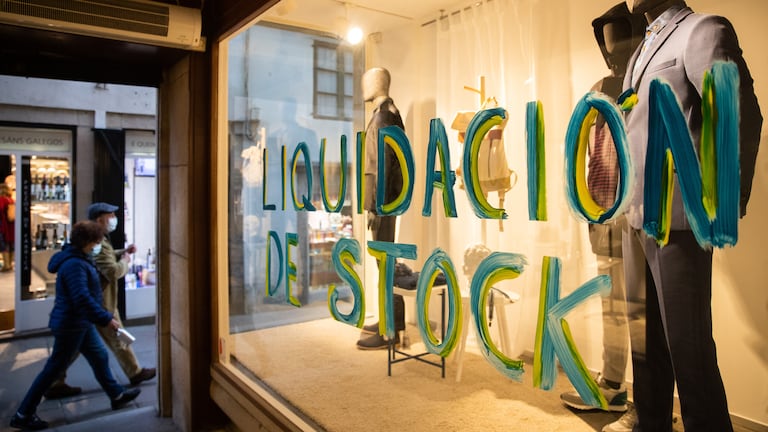Clearance in a store in the center of Santiago.OSCAR CORRAL
Pilar Ruiz, 33, is a
rare bird
.
While in April the world seemed to be crumbling in the middle of a pandemic and ERTEs overflowed the employment offices, she was promoted in her job as a business analyst for a real estate agency.
His sister Beatriz, 27, stayed where she was: in her position as a resident doctor at the Aravaca health center and on duty at the Puerta de Hierro hospital in Madrid.
A delicate place when a virus is on the loose, with much more demand, but where it has also been protected from the vagaries of the job market.
Pilar telework, canceled her plans to travel to Africa this summer and her car barely leaves the garage.
He no longer travels the 15 kilometers there and 15 back each day that separate his home in Madrid from his office.
Nor does she put on makeup or cologne as she has reduced her outings to a minimum.
Beatriz lists the things she stopped doing during the confinement and they have not yet returned to their normal routine: going to the movies, concerts, restaurants, traveling.
Absorbed by work overload, clad in hospital pajamas, she barely buys clothes.
The change in habits due to confinements, with much fewer opportunities to consume due to business closures, together with greater uncertainty about whether they will be able to maintain their income in a future marked by the crisis, has given rise to a generalized phenomenon among officials, salaried employees or pensioners who have continued to be paid on time each month: household savings have shot up to a record 22.5% of disposable income at the end of the second quarter, according to data from the National Institute of Statistics.
The same conclusion can be reached by observing the latest figures from the Bank of Spain: until September, families had 760.3 billion euros in demand deposits, an unprecedented level.
Even in summer, where they traditionally fall due to spending during the vacation period, they continued to increase.
"Workers who have not lost their jobs or fallen into an ERTE, those who are undefined, and those who can telework are saving a lot," explains Ignacio Conde-Ruiz, deputy director of the Foundation for Applied Economics Studies (Fedea) and professor at the Complutense University.
“But if you had a temporary contract and you have lost it, you have entered ERTE or you are at risk of poverty, you cannot save.
It is very asymmetrical, very unequal in terms of income level ”, he adds.
It is one of the paradoxes of the pandemic.
The drop in consumption, of 23.9% in the second quarter, has penalized precarious workers, the self-employed and entrepreneurs, but inflates the checking accounts of those employees, civil servants and retirees who have not seen their income diminish.
Simplified, the evils for trade can be summarized in one sentence: those who have lost purchasing power due to the crisis do not spend beyond their vital needs because they cannot, and those who have not earned it either, because they save in the face of the uncertainty of the outlook or the discomfort of restraints.
When asked if now is the time in her life when she has more savings, Beatriz Ruiz does not hesitate: “clearly”, she assures.
The diagnosis of their personal finances is accompanied by a certain modesty given the difficult circumstances that part of the population is going through.
"It doesn't matter that while you continue to earn money there are people asking for food, but that's what public aid is for," he says.
Conde-Ruiz believes that the Budgets could have been better if instead of raising the salaries of civil servants in a context of negative inflation, they had streamlined the Minimum Vital Income or launched temporary aid to the most affected families.
"Not only would it be fairer, but it would also have a higher spending multiplier, since they are going to spend it insurance because they do not have the capacity to save, while the official will save a part for precautionary reasons."
The last trip of José Luis Muñoz-Cobo, 71, retired and emeritus professor at the Polytechnic University of Valencia specialized in nuclear engineering, was to Argentina in December.
This summer he did not comply with the ritual of the great summer trip with his wife, Consuelo Higón.
He acknowledges that thanks to the savings and the pension he has little uncertainty, but argues that he has earned it after almost 46 years of contributions.
Although in a less ferocious way, it has also suffered the economic consequences of the pandemic in its own way: they have forgiven a month and lowered the rent for a motorhome business that operates in a warehouse of their property in Asturias for several more, and their plans to Stock market-related pensions have suffered.
Emilio Ontiveros, president of Analistas Financieros Internacionales (Afi), recalls that it is variable expenses, associated with conduct, that are falling.
The fixed, such as the mortgage or rent, are maintained, and in some cases such as electricity, gas or Internet, they go up.
Miguel Ángel Rozas, from Madrid, an official of the Official Credit Institute for 27 years, attests to this.
You are not among those who have saved.
He says that he has had to increase his data rate when working from home, he spends more on heating, he has bought an ergonomic chair and he allows himself more luxuries when shopping at the supermarket.
"For companies it is a bargain, they do not pay for air conditioning, cleaning, water, electricity or security";
he complains.
Some entities, such as Afi, have paid their employees who telework the cost of the chair or work table, but it is not generalized.
Increasing savings has a silver lining.
"I think not in the fourth quarter, but next year with the arrival of the vaccine that embalmed savings will end up in consumption," predicts the economist Ignacio de la Torre.
The manager of the investment firm Arcano explains that one of the keys to the rise in Spanish GDP in the third quarter was greater than expected is that the return of household spending was underestimated.
A report prepared by your entity under the title
The post-covid world
anticipates a robust reactivation of consumption.
"Let us always remember that the great tragedy of the
Spanish
flu
of 1918-1919 was not followed by a state of collective depression, but rather by the joyous and wild 1920s," the text states.
The European Commission is also waiting for you.
Although in its autumn forecasts, published at the beginning of the month, it is cautious in the longer term.
“The drop in consumption will be followed by a relatively strong rebound next year, as households will gradually release accumulated savings and adjust their spending patterns to the reality of the pandemic.
However, private consumption growth is projected to moderate in 2022, largely due to lingering uncertainty about employment and income prospects that will likely keep preventative savings high. "
The big question now is to what extent saving, coupled with the manna from European funds, will lead to a virtuous cycle of more consumption, more growth and more jobs.
Ontiveros warns of possible psychological consequences in our economic behavior.
Perhaps the public rescue of the hardest hit allows a softer landing, but it is not clear that we will again pull our portfolio with such joy.
“The pandemic has reinforced the perception of vulnerability.
The 2007 crisis was a big scare.
It raised the general perception that the economic system was more vulnerable than we thought.
And that is being internalized ”, he concludes.













